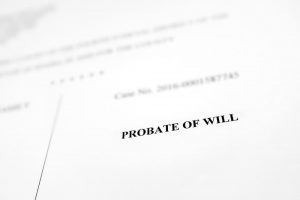Losing a loved one is one of the hardest experiences for a family. In addition to grieving their loss, family members and heirs often find that dealing with the business affairs of the deceased person is more complicated than they expected. One concern that comes up frequently is the length of time it will take to go through the process of probating the will. An effective probate process requires a specific series of events to take place. The timeframe also depends on how efficiently each of these steps happens.
Having clarity about the process can help you understand everything that needs to happen so that things can go as smoothly as possible. Contact us with questions about your specific case.

The Probate Process
The probate process for wills is handled in a court of law. In Dallas County, the Dallas County Probate Court has the jurisdiction to probate the wills of those who have passed away. This court also has the power to declare the heirs if the deceased did not have a will.
The probate process officially begins when someone files an Application for Probate of Will and for Issuance of Letters Testamentary with the probate court clerk. The person who files these papers is often the person who is named as Executor or Executrix of the will. An attorney can also file on their behalf. The application should include the original will.
After the application has been filed, the court clerk will then notify the relevant parties of the probate of the will’s estate. There is a requisite time of 10 days so that the court has enough time to notify the public that the will was filed to probate. After, the court will schedule a hearing to admit the will to probate and to issue Letters Testamentary. Once the hearing has occurred, the judge signs an order, and the Executrix or Executor swears an oath that they will lawfully administer their duties. Following the oath, the Executor or Executrix will then receive the Letters Testamentary, which will give them the authority to administer the estate.
Contact us today if you have pressing questions.
Executor or Executrix’s Duties During Probate
With the assistance of a probate attorney, the Executor or Executrix must notify creditors in the newspaper within a month of receiving the Letters Testamentary. They also need to notify known creditors of the issuance of the Letters Testamentary.
Within 60 days of the court order, the Executor or Executrix is also required to send letters to each of the beneficiaries along with a copy of the will.
Within 90 days of the order, the Executor or Executrix must also file a sworn affidavit notifying the court that they have completed the notice to the beneficiaries. Also, within 90 days of the court order, the Executor or Executrix must file an Inventory, Appraisement, and List of Claims with the court.
If an independent administrator is appointed as Executor or Executrix of the will, they will be able to complete all the other associated duties without the supervision of the court. They must pay due claims and taxes and disburse the deceased assets to beneficiaries according to the terms outlined in the will.
Probate Process Timeframe
If the probate is an independent administration and the estate is simple, the whole probate process can potentially reach completion in six months or less. However, several complicating factors can lengthen the timeframe considerably. If the probate is a dependent administration, the increased supervision and involvement of the court can mean that the process may take up to a year or even longer.
Other situations can also lengthen the timeframe, such as if the original will cannot be located or if beneficiaries or creditors file claims against the estate. Such circumstances will require additional time to resolve.

How a Dallas Probate Attorney Can Help
Hiring an experienced probate attorney can help you ensure that the probate process goes as smoothly as possible if you are the Executor or Executrix of a will. They can assist and advise you in properly discharging your fiduciary duties and drafting the necessary legal filings and pleadings quickly.
The Dallas probate lawyers at Staubus, Blankenship, Legere and Walker PLLC have the knowledge and experience to help you with the various procedures of the Dallas County Probate Court. Our seasoned probate legal team will be there with you at every step to streamline the process and help you see to it that your loved one’s estate is distributed efficiently and correctly.
Contact us online, or call us for a consultation today at (214) 833-0100.



